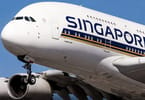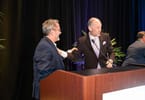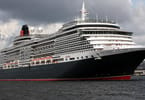London — Analysts say the year-old Open Skies aviation pact, which encouraged partnerships such as Delta Air Lines’ with Air France, has brought passengers lower fares and improved schedules even as airlines buck global economic head winds.
“It now costs about as much for me to fly to Europe from the East Coast of the U.S. as it does for me to fly to the West Coast,” said Ernest Arvai, an airline industry consultant based in Windham, N.H.
Business travelers have fared even better than economy passengers, now that the $10,000 business-class tickets and $15,000 first-class tickets of a few years ago are available at half those prices from consolidators, he said.
Airlines agree that the Open Skies pact — an agreement between the United States and the European Union that ended limits on airlines flying between the United States and Europe and opened London’s Heathrow Airport to all U.S. carriers — has yielded broad benefits since taking effect March 28, 2008.
“It’s resulted in better fares and better frequencies and better scheduling and better product,” David Bishko, Delta’s Paris-based managing director for alliances, said in a phone interview.
He said that ordinarily a global economic downturn as severe as today’s would have spelled financial disaster for many airlines.
“But we were able to really get our costs down even before the downturn, not only because of lowering fuel costs but also because of the benefits of our partnerships and Open Skies,” Bishko said.
In October 2007, Atlanta-based Delta signed a joint venture agreement with Air France, which merged with Dutch carrier KLM in 2004.
“Already they have coordinated their Heathrow slot holdings such that Delta has sufficient slots to operate a commercially viable pattern of service from Heathrow using former Air France slots, and they have also placed the Air France code on Delta’s new services,” said Robert Mann, an aviation consultant in Port Washington, N.Y.
“There’s no question that Open Skies has benefited consumers via new market entry, and the antitrust-immune partnerships have inaugurated nonstop services that no single carrier would risk,” he said.
Yet even Open Skies hasn’t mitigated all the additional pressures placed on the airline industry by the worsening global economy.
Overall, the trans-Atlantic air travel market will shave capacity by nearly 6 percent in the first quarter of 2009 compared with the same period last year, according to a research note from financial services firm UBS.
Fort Worth, Texas-based American Airlines, which has faced increased competition at Heathrow from Delta and others, is shrinking its U.K. services by as much as 17 percent this quarter, UBS said.
Other airlines also are reducing their international capacity. Houston-based Continental said it would shed between 4 percent and 5 percent of its consolidated domestic and international capacity this year.
Delta said this month that it would slash its international flights by 10 percent, beginning in September, because of the weak global economy. The cuts will come in areas where the airline has seen the most revenue weakness — its Atlantic and Pacific networks.
Compared with 2008, Delta said, trans-Atlantic capacity this winter will be down 11 percent to 13 percent and trans-Pacific capacity will be down 12 percent to 14 percent.
The cuts come on top of a December announcement to reduce 2009 capacity by
6 percent to 8 percent, systemwide, year over year.
While some analysts acknowledge that now is a bad time for Delta to digest its deal with Air France and its merger with Northwest, they also agree that the structural changes in the airline industry had to be made.
“Ultimately, consumers should benefit from larger global networks with more liberal aviation agreements between countries,” said Patrick Murphy, a principal of aviation consulting firm Gerchick Murphy Associates in Washington.
Likewise, Mann said the timing of Delta’s switch next month to new aircraft with lie-flat seats flying in and out of Heathrow also is unfortunate, considering the downturn in demand for premium fare travel.
“But it will pay off in the long run,” he said.
Murphy agreed that the economic recession has overtaken Open Skies’ first-year benefits, but that the long-term consequences are still to be had — especially if foreign ownership restrictions are liberalized in Phase Two talks of the pact.
Europe hopes Phase Two will lead to the United States offering reciprocal concessions on foreign ownership of U.S. airlines and the right for European carriers to fly U.S. domestic routes as an extension of international service.
It’s still not clear what stance the Obama administration plans to take on the negotiation of Phase Two of the deal.
One analyst who’s still not excited about Open Skies’ prospects is Mike Boyd, an aviation consultant with the Boyd Group in Evergreen, Colo.
“Here’s a flash of aviation heresy, but one that’s true: There aren’t many material opportunities for additional trans-Atlantic flying, mainly because most of the points on either side of the pond that can support nonstop service to the other side already have service,” he said.
“Sure, Open Skies will let a lucky carrier open up the lucrative Omaha-to-London route or the ever-popular Tampa-to-Turin market,” he said sarcastically. “And go bust doing it.”
WHAT TO TAKE AWAY FROM THIS ARTICLE:
- “Already they have coordinated their Heathrow slot holdings such that Delta has sufficient slots to operate a commercially viable pattern of service from Heathrow using former Air France slots, and they have also placed the Air France code on Delta's new services,” said Robert Mann, an aviation consultant in Port Washington, N.
- While some analysts acknowledge that now is a bad time for Delta to digest its deal with Air France and its merger with Northwest, they also agree that the structural changes in the airline industry had to be made.
- Airlines agree that the Open Skies pact — an agreement between the United States and the European Union that ended limits on airlines flying between the United States and Europe and opened London's Heathrow Airport to all U.






















